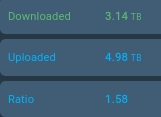VPN as the day of today?
-
What does VPN hide that HTTPS can’t hide for media server?
I am looking at the scenario of listening to my music collection on self-hosted Jellyfin server.
IP address of my phone? That’s irrelevant.
HTTPS is way faster than VPN.
VPN into your home lab isn't about privacy, it's more about reducing your exposed services to the public internet.
If you have only the ports needed to VPN back into your network, then the rest is hidden behind your router. You only need to fully secure one thing, instead of having to ensure that everything is 100% patched.
It's not the only thing you should be doing, but it does help reduce the probability of a breach.
-
The problem with Mullvad is that there is not port forwarding for seeding stuff
There's no problem with seeding. There's actually more uploaded than downloaded

-
Privacy is a trade-off against convenience, and there is no perfect privacy.
VPNs are a mediocre privacy tool, because they presuppose trust in the VPN provider. Tor is flawed because it is open to correlation attacks.
There are low-hanging fruit that everybody should be using like sensible cookie policies, HTTPS-only mode, and DNS over HTTPS.
If you are looking for a solution on the far end of privacy/inconvenience you could look into I2P and use that situationally.
I would rather put my trust in a good VPN provider than the big CAs. And HTTPS only and DoH is not going to protect you from fingerprinting using your IP address.
-
Are VPN good for privacy today, should we used them to protect our privacy?
Not free, none have all advantages and wouldn't let my ISP only know my traffic so these times I'm really overwhelmed by all of this
Used Tor for a bit but it's not practically useful, slow (okay but not the main problem) and blocked by a lot of websites..
Maybe a chain of VPN could be good? I really don't know, can you help me?
Basically I don't want to have no protection but don't think VPNs are really the solution...
This all kind of depends on your threat model... a VPN hides traffic from your ISP, and puts your traffic in with a lot of other traffic, but domestic IPs generally rotate fairly frequently, so only your ISP really knows when that happens, but they also probably sell that data because we live in an over-financialized, under-regulated hellscape, but your VPN also exists in that hellscape, and knows who you are just as much unless you buy Mulvad with perfectly laundered monero and is as likely to be selling that data if not more so than your ISP. There's a reason why people use tor...
-
There's no problem with seeding. There's actually more uploaded than downloaded

not working quite that well on my end. no matter how popular torrent, mine won't seed at all. and i can't download some rare ones where there's like less than 50 seeds.
-
not working quite that well on my end. no matter how popular torrent, mine won't seed at all. and i can't download some rare ones where there's like less than 50 seeds.
What OS are you using? App? If you're using qbittorent make sure you have selected tun in advanced -> network interface
-
What does VPN hide that HTTPS can’t hide for media server?
I am looking at the scenario of listening to my music collection on self-hosted Jellyfin server.
IP address of my phone? That’s irrelevant.
HTTPS is way faster than VPN.
It could hide your IP from someone on Lemmy finding your IP address
-
VPN into your home lab isn't about privacy, it's more about reducing your exposed services to the public internet.
If you have only the ports needed to VPN back into your network, then the rest is hidden behind your router. You only need to fully secure one thing, instead of having to ensure that everything is 100% patched.
It's not the only thing you should be doing, but it does help reduce the probability of a breach.
I don't see how exposing only port 443 makes much difference and port 80 for letsencrypt renewals.
-
It could hide your IP from someone on Lemmy finding your IP address
Any HTTP proxy will do it without VPN complexity.
-
Any HTTP proxy will do it without VPN complexity.
They didn't really ask about a proxy server, I just gave them one thing a VPN could do
-
System shared this topic on


